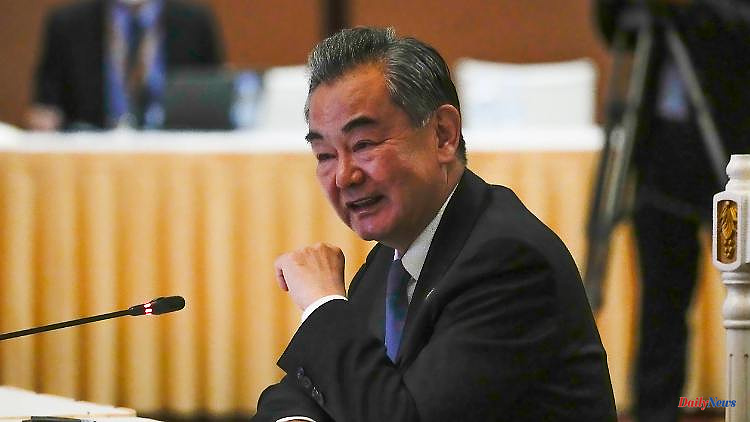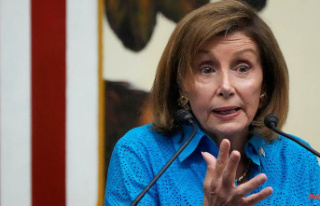After Nancy Pelosi's visit to Taiwan, China initially imposed sanctions on the US top politician. Now the republic is also stopping the dialogue on climate protection and defense with the USA. Nevertheless, several German politicians want to travel to Taiwan in October.
In protest at the visit of US leader Nancy Pelosi to Taiwan, China has suspended dialogue with the US on climate protection and other cooperation. As the Foreign Ministry announced in Beijing, three dialogue forums on military and defense issues will be completely canceled. Cooperation in the fight against drugs, cross-border crimes, legal assistance in criminal cases and the repatriation of people who have entered the country illegally are suspended.
China also imposed sanctions on Pelosi itself. As the State Department announced in Beijing, the unspecified sanctions against the chair of the US House of Representatives and number three in the US are also aimed at their direct family members.
By traveling to Taiwan against strong opposition from Beijing, the US top politician "seriously interfered in China's internal affairs," said Chinese Foreign Ministry spokeswoman Hua Chunying. Pelosi has also undermined China's sovereignty and territorial integrity and "severely trampled on the One China" principle. Chunying spoke of Pelosi's "outrageously provocative behavior".
In response to the visit of the top US politician to the democratic island republic, the communist leadership in Beijing had already started large-scale maneuvers around Taiwan, which met with sharp criticism internationally. Her visit to Taipei was the highest from the United States in a quarter century. The communist leadership refuses such official contacts with Taiwan because they claim the island for themselves. Beijing sees the self-governing Taiwan as part of the People's Republic and is threatening a violent conquest. The 23 million Taiwanese, on the other hand, see themselves as independent.
US Secretary of State Antony Blinken accused China of wanting to change the status quo in the Taiwan Strait with the missile tests and military exercises. At the meeting of the Southeast Asian community of states ASEAN in Phnom Penh, Cambodia, Blinken said there was no justification for the military provocations after Pelosi's peaceful visit to Taiwan, as quoted by a Western representative, according to the Bloomberg news agency.
Taiwan's President Tsai Ing-wen called the maneuvers and missile exercises "irresponsible". In a video address, the President urged the Chinese leadership to exercise common sense and exercise restraint. Taiwan will not escalate tensions but wants to maintain the status quo. The President thanked the G7 group of the seven leading industrial nations, which includes the European Union, for their support. The G7 had expressed concern and stressed that there was no reason to use a visit as a pretext "for aggressive military activities".
In Beijing, ambassadors from the EU countries, Japan, Canada and the EU representatives were summoned to the Foreign Ministry, where they were handed a formal protest against the G7 statement. Germany currently holds the presidency of the G7. In the international storm of criticism, China and Russia demonstrated solidarity.
At the ASEAN meeting, China's Foreign Minister Wang Yi accused the US of "provocation" and "meddling." At a meeting with his counterpart in Phnom Penh, Russia's Foreign Minister Sergey Lavrov backed China. Against the background of Russia's war of aggression against Ukraine, Lavrov described Moscow's alliance with Beijing as a "pillar" of international law, as quoted by the Interfax agency.
A trip by the Human Rights Committee of the Bundestag could cause new turmoil: The members of parliament want to travel to Taiwan at the end of October. The trip between October 22nd and 30th is also to go to Japan and the Chinese special administrative region of Hong Kong. MEPs from all six parliamentary groups are expected to attend.
The parliamentarians do not want to be intimidated by China's threatening gestures. "There aren't many democracies left in Asia. That's why we have to support them and not let China impose its rules on us," says FDP politician Peter Heidt, who wants to take part in the Human Rights Committee's trip.
The CDU politician Michael Brand also sees no reason in the Chinese threats to distance himself from the travel plans that have been in place for a long time. "The Chinese leadership must ensure that it doesn't just become a threat-spewing dragon on the international stage. A little more Asian discipline would be appropriate," he says.












